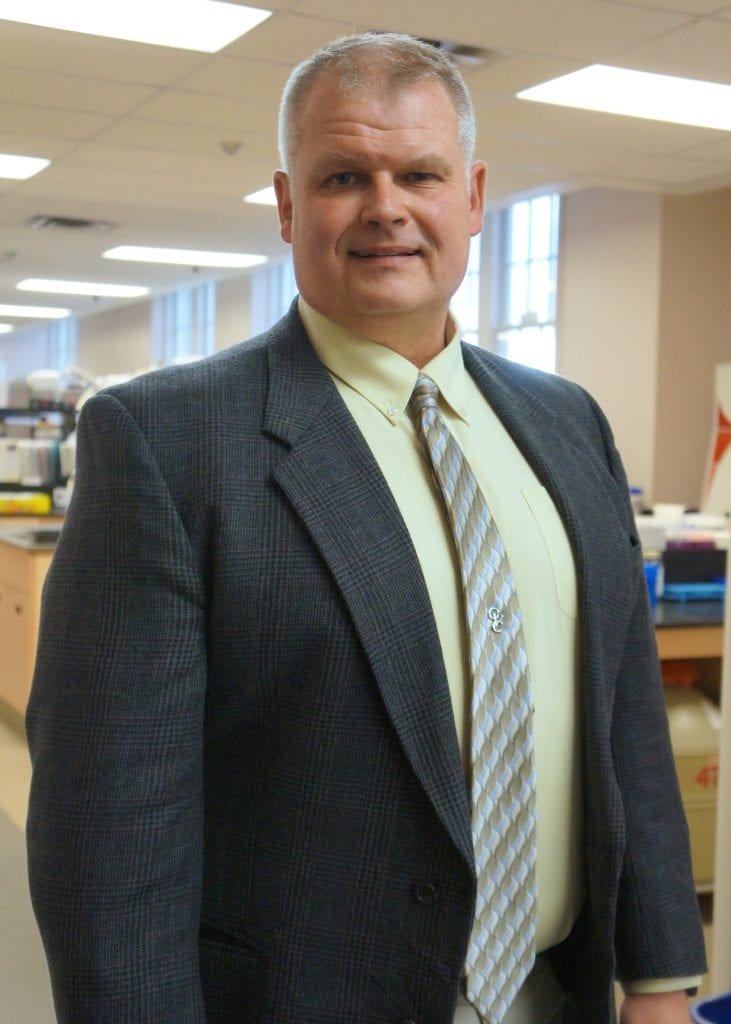Meet Dr. Jim Petrik

MSc, PhD
Keywords: Ovarian Cancer, Anti-Angiogenic Therapies, Vascular Normalization, Tumour Vascular Perfusion, Angiogenesis, Mevalonate Pathway in Metastatic Disease, Tissue and Vascular Remodelling, Regenerative Medicine, Therapeutics for Ovarian Cancer and Metastatic Disease, Female Reproductive Biology
Profile(s): University of Guelph Experts, Department of Biomedical Science
Professional Experience & Honours
- Tier I CIHR Canada Research Chair
- Fellow, Canadian Academy of Health Sciences
- Professor – Department of Biomedical Sciences, University of Guelph, Ontario Veterinary College
- Part-Time Adjunct Professor – Department of Obstetrics and Gynecology, McMaster University, Health Sciences
- Part-Time Adjunct Professor – Department of Experimental Oncology, Western University
Education
- MSc, PhD – Molecular Biology (Western University, London, Ontario, Canada)
- Post Doctoral Fellowship (University of Guelph, Guelph, Ontario, Canada)
Research Themes & Interests
Our laboratory is focused on discovering novel therapies for advanced-stage cancers. We have made significant advances in our understanding of tumor vasculature in ovarian cancer and how this may be an important therapeutic target. Tumors must recruit their own blood supply through a process of angiogenesis in order to meet their metabolic needs. However, the angiogenic program initiated by tumors is extremely aggressive and as a result, blood vessels are formed very quickly. Tumor vasculature is characterized by poorly-formed, dysfunctional vessels, with limited tissue perfusion. The result is a tumor with poor blood supply, areas of low oxygen, and high levels of pressure, due to leakage from the tumor vessels. This phenotype dramatically impedes the ability of therapeutic compounds to enter the tumor. Through our extensive collaborations, we have developed a fusion protein that links two Type I Repeat regions (3TSR) of Thrombospondin-1 (TSP-1) to form Fc3TSR. We have shown that Fc3TSR is toxic to tumor cells and specifically targets the dysfunctional, immature tumor vasculature. Fc3TSR prunes the tumor vessels back to its original, healthy parental vasculature. The result of 3TSR treatment is a smaller tumor with reduced pressure and normalized tissue perfusion. By re-establishing vascular supply to the tumor, we have been able to dramatically increase the uptake and efficacy of a number of therapies including chemotherapy drugs, oncolytic viruses, and immunotherapies. With combination therapy, we have been able to induce regression of advanced stage disease in preclinical models of ovarian and pancreatic cancer.
Another area of research focus is understanding the alarmingly high rate of cancers in firefighters. We know that firefighters can have an up to 8x higher incidence of cancers than the general public. I have developed an exciting collaborative research program that brings together my cancer research expertise with my longstanding involvement in the fire service. In this program, I am collaborating with a number of researchers across Canada (PI- Dr. Patrick McGrath, Dalhousie) to study the incidence of cancers in firefighters that are exposed to carcinogens during their activities in putting out fires. Exposure to carcinogenic compounds is extremely high during structure and vehicle fires. Although firefighters wear self-contained breathing apparatus (SCBAs) during these incidents, research has shown that these compounds get trapped in the material in the firefighters’ protective equipment and then “off gas” for hours afterwards – typically long after the protective SCBAs are no longer being worn. New decontamination procedures are being developed and implemented, but there is evidence that there is slow uptake of these procedures within the fire service. This study will involve a survey-based study on exposures and participation in decontamination procedures by firefighters and will prospectively evaluate cancer incidence. As a member of the Canadian Association of Fire Chiefs Cancer Committee, we are working with primary care physicians to increase the awareness of the heightened risk of cancers in firefighters and to develop a robust monitoring system for the prevention and early detection of cancers in this extremely vulnerable group.
Recent Research Focuses & Partnerships
- Treatment of advanced stage ovarian cancer in animal models by targeting abnormal vascularization in tumours with anti-angiogenic peptides in collaboration with researchers at Harvard University.
- Targeting of the mevalonate pathway which is important in facilitating migration and survival of metastatic ovarian cancer cells. Inhibition of this pathway significantly impairs the ability of the metastatic cancer cells migrate within the abdomen and to initiate tumorigenic mechanisms.
- Determining the mechanisms by which cancer cells alter their metabolism and use of energy substrates.
- Identify the roles that various factors play in regulating ovarian angiogenesis and female reproductive function.
Select Publications
- Pereira M, Glogova A, Haagsma J, Stewart J, Shepherd TG, Petrik J. Mutant p53 murine oviductal epithelial cells induces progression of high-grade serous carcinoma and are most sensitive to simvastatin therapy in vitro and in vivo. J Ovarian Res. 16: 218, 2023
- Cook DP, Galpin KJC, Rodriguez GM, Shakfa N, Wilson-Sanchez J, Echaibi M, Pereira M, Matuszewska K, Haagsma J, Murshed H, Cudmore AO, MacDonald E, Tone A, Shepherd TG, Petrik J, Koti M, Vanderhyden BC. Comparative analysis of syngeneic mouse models of high-grade serous ovarian cancer. Commun Biol.6: 1152, 2023
- Son JS, Chow R, Kim H, Lieu T, Xiao M, Kim S, Matuszewska K, Pereira M, Nguyen DL, Petrik J. Liposomal delivery of gene therapy for ovarian cancer: a systematic review. Reprod Biol Endocrinol. 21: 2023
- Petrik J, Lauks S, Garlisi B, Lawler J. Thrombospondins in the tumor microenvironment. Semin Cell Dev Biol. 2023
- Minott JA, van Vloten JP, Yates JGE, Chan L, Wood GA, Viloria-Petit AM, Karimi K, Petrik J, Wootton SK, Bridle BW. Multiplex flow cytometry-based assay for quantifying tumor- and virus-associated antibodies induced by immunotherapies. Front Immunol. 13: 1038340, 2022.
- Pereira M, Matuszewska K, Glogova A, Petrik J. Mutant p53, the mevalonate pathway and the tumor microenvironment regulate tumor response to statin therapy. Cancers. 14: 2022
- Van Vloten JP, Matuszewska K, Minow MAA, Minott JA, Santry LA, Pereira M, Stegelmeier AA, McAusland TM, Klafuric EM, Karimi K, Colassanti J, McFadden DG, Petrik J, Bridle BW, Wootton SK. Oncolytic Orf virus licenses NK cells via cDC1 to activate innate and adaptive antitumor mechanisms and extends survival in a murine model of late-stage ovarian cancer. J. Immunother Cancer. 10: 2022.
- Stegelmeier AA, Santry LA, Guillerman MM, Matuszewska K, Pereira M, Minott JA, Yates JGE, Stevens BAY, Thomas SP, Vanderkamp S, Hanada K, Pei Y, Rghei AD, van Vloten JP, Thompson B, Major PP, Petrik J, Bridle BW, Wootton SK. AAV-vectored expression of the vascular normalizing agents 3TSR and Fc3TSR and the anti-angiogenic Bevacizumab extends survival in a murine model of end-stage epithelial ovarian carcinoma. Biomedicines. 2022
- Matuszewska K, Ten Kortenaar S, Pereira M, Santry LA, Petrik D, Lo KM, Bridle BW, Wootton SK, Lawler J, Petrik J. Addition of an Fc-IgG induces receptor clustering and increases the in vitro efficacy and in vivo anti-tumor properties of the thrombospondin-1 type I repeats (3TSR) in a mouse model of advanced stage ovarian cancer. Gynecol Oncol, 164: 154-169, 2022.
- Mould RC, van Vloten JP, AuYeung AWK, Walsh Sr, de Jong J, Susta L, Mutsaers, Petrik J, Wood GA, Wootton SK, Karimi K, Bridle BW. Using a prime-boost vaccination strategy that proved effective for high resolution epitope mapping to characterize the elusive immunogenicity of survivin. Cancers. 13: 6270, 2021.
- Van Vloten JP, Minott JA, McAusland TM, Ingrao JC, Santry LA, McFadden G, Petrik J, Bridle BW, Wootton SK. Production and purification of high-titre OrfV for preclinical studies in vaccinology and cancer therapy. Mol Ther Methods Clin Dev. 23: 434-447, 2021.
- Ram AS, Matuszewska K, Petrik J, Singh A, Oblak ML. Quantitative and semi-quantitative methods for assessing the degree of methylene blue staining in sentinel lymph nodes in dogs. Front Vet Sci. 8, 2021
- Pereira M, Matuszewska K, Jamieson C, Petrik J. Characterizing endocrine status, tumor hypoxia, and immunogenicity for therapy success in epithelial ovarian cancer. Front Endocrinol. 12, 2021
- Matuszewska K, Pereira M, Petrik D, Lawler J, Petrik J. Normalizing tumor vasculature to reduce hypoxia, enhance perfusion, and optimize therapy uptake. Cancers. 13: 4444, 2021
- AuYeung AWK, Mould RC, Stegelmeier AA, van Vloten JP, Karimi K, Woods JP, Petrik J, Wood GA, Bridle BW. Mechanisms that allow vaccination against an oncolytic vesicular stomatitis virus-encoded transgene to enhance safety without abrogating oncolysis. Sci Rep. 11: 152190, 2021.
- Morandi V, Petrik J, Lawler J. Endothelial cell behavior is determined by receptor clustering induced by thrombospondin-1. Front Cell Dev Biol. 9: 664696, 2021.
- Santry LA, van Vloten JP, Knapp JP, Matuszewska K, McAusland TM, Minott JA, Mould RC, Stegelmeier AA, Major PP, Wootton SK, Petrik J, Bridle BW. Tumor vasculature: friend or foe of oncolytic viruses? Cytokine Growth Factor Rev. S1359-6101, 2020
- Stegelmeier AA, Chan L, Mehrani Y, Petrik J, Wootton SK, Bridle B, Karimi K. Characterization of the impact of oncolytic vesicular stomatitis virus on the trafficking, phenotype, and antigen presentation potential of neutrophils and their ability to acquire a non-structural viral protein. Int J Mol Sci 21: 2020.
- Yu DL, Stegelmeier AA, Chow N, Rghei AD, Matuszewska K, Lawler J, Bridle BW, Petrik J, Wootton SK. AAV-mediated expression of 3TSR inhibits tumor and metastatic lesion development and extends survival in a murine model of epithelial ovarian carcinoma. Cancer Gene Ther. 27: 356-367, 2020
- Wallace JG, Bellissimo CJ, Yeo E, Fei Xia Y, Petrik J, Surette MG, Bowdish DME, Sloboda DM. Obesity during pregnancy results in maternal intestinal inflammation, placental hypoxia, and alters fetal glucose metabolism at mid-gestation. Sci Rep. 9: 17621, 2019
- Pal P, Hales K, Petrik J, Hales DB. Pro-apoptotic and anti-angiogenic actions of 2-methoxyestradiol and dcosahexaenoic acid, the biologically derived active compounds from flaxseed diet, in preventing ovarian cancer. J Ovarian Res. 25: 2019
- Van Vloten JP, Santry LA, McAusland TM, Karimi K, McFadden G, Petrik J, Wootton SK, Bridle BW. Quantifying antigen-specific T cell responses when using antigen-agnostic immunotherapies. Mol Ther Methods Clin Dev. 13: 154-166, 2019
- Matuszewska K, Santry LA, van Vloten JP, Au Yeung AWK, Major PP, Lawler J, Wootton SK, Bridle BW, Petrik J. Combining vascular normalization with an oncolytic virus enhances immunotherapy in a preclinical model of advanced stage ovarian cancer. Clin Canc Res. 25: 1624-1638; 2019
- Kellenberger LK, Petrik J. Hyperglycemia promotes insulin-independent ovarian tumor growth. Gynecologic Oncology. Epub ahead of print. 2018
- Subramaniam N, Petrik JJ, Vickaryous MK. VEGF, FGF-2 and TGFb expression in the normal and regenerating epidermis of geckos: implications for epidermal homeostasis and wound healing. J. Anatomy. Epub ahead of print. Doi:10.1111/joa/12784. 2018
- Dynes J, Osz K, Hooper A, Petrik J. Low dose metronomic delivery of cyclophosphamide is less detrimental to granulosa cell viability and ovarian function than maximum tolerated dose delivery in the mouse. Biology of Reproduction. 97: 449-465, 2017
- Greenaway J, Virtanen C, Osz K, Revay T, Hardy D, Shepherd T, DiMattia G, Petrik J. Ovarian tumor growth is characterized by mevalonate pathway gene signature in an orthotopic, syngeneic mouse model of epithelial ovarian cancer. Oncotarget. 7: 47343-47365, 2016
- Linnerth-Petrik NM, Santry LA, Moorehead R, Jucker M, Wootton SK, Petrik J. Akt isoform specific effects in ovarian cancer progression. Oncotarget. 7: 74820-74833, 2016.
- Russell S, Duquette M, Liu J, Drapkin R, Lawler J, Petrik J. Combined therapy with thrombospondin-1 type I repeats (3TSR) and chemotherapy induces regression and significantly improves survival in a preclinical model of advanced stage epithelial ovarian cancer. FASEB J. 29: 576-588, 2015.
- Ten Kortenaar S, Lawler J, Petrik J. Anti-Angiogenic Therapy in Induction of Blood Vessel Normalization in the Treatment of Ovarian Cancer. Current Angiogenesis, 3: 203-214, 2014.
- Osz K, Ross M, Petrik J. The thrombospondin-1 receptor CD36 is an important mediator of ovarian angiogenesis and folliculogenesis. Reprd Biol Endocrinol. doi: 10.1186/1477-7827-12-21.March 2014.
- Greenaway JB, Koehler A, McCulloch CA, Petrik J, Brown TJ, Ringuette MJ. The impact of the ovarian microenvironment on the anti-tumor effect of SPARC on ovarian cancer. Biochem Cell Biol. 90: 96-107, 2012.
- Campbell NE, Greenaway J, Henkin J, Petrik J. ABT-898 induces tumor regression and prolongs survival in a mouse model of epithelial ovarian cancer. Mol Cancer Ther. 10: 1876-1885 2011.
- McGray AJ, Gingerich T, Petrik JJ, LaMarre J. Rapid insulin-like growth factor-I-induced changes in granulosa cell thrombospondin-1 expression in vitro. J Reprod Dev. 57: 76-83, 2011.
- Campbell NE, Kellenberger LD, Greenaway J, Linnerth-Petrik N, Moorehead RA, Petrik J. Extracellular matrix proteins and tumor angiogenesis. J Oncol. Epub ahead of print. 586905, June, 2010.
- Campbell NE, Greenaway J, Henkin J, Moorehead RA, Petrik J. The thrombospondin-1 mimetic ABT-510 increases the uptake and effectiveness of cisplatin and paclitaxel in a mouse model of epithelial ovarian cancer. Neoplasia. 12: 275-283, 2010.
- Kellenberger LD, Bruin JE, Greenaway J, Campbell N, Moorehead RA, Holloway AC, Petrik J. The role of dysregulated glucose metabolism in epithelial ovarian cancer. J Oncol. Epub ahead of print. 514310, Jan 2010.
- Full link to publications: https://www.researchgate.net/profile/Jim-Petrik-2
Contact
Email: jpetrik@uoguelph.ca
Phone: (519) 824-4120 Ext: 54921
Office: OVC 3627
Ontario Veterinary College
University of Guelph
50 Stone Road E.,
Guelph, ON, Canada, N1G 2W1



